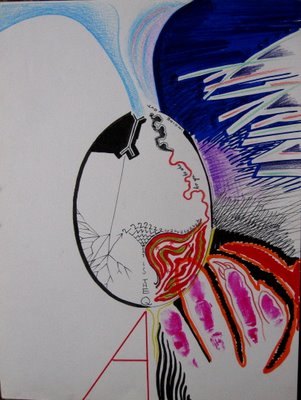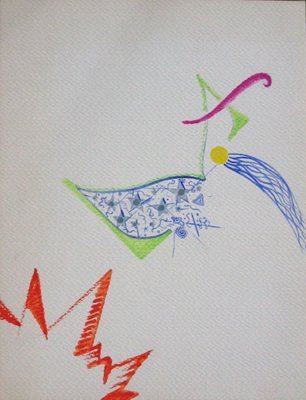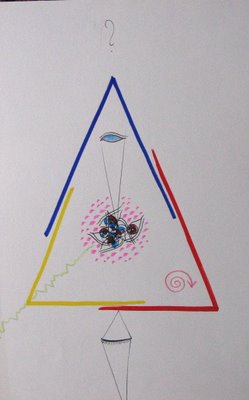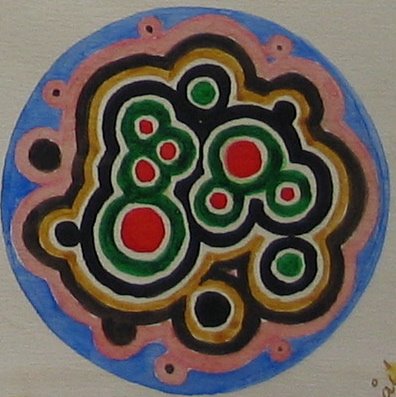My mother told me how she as a young girl in school suddenly realized: “This is all old wives’ tales!” She became a scientist and she didn’t give thought to the mysteries that science could not explain. In fact my whole family is more or less allergic to religion and they seem to live quite happily with this attitude.
 I had different feelings. As I got older I had an urge to understand more and I began to search for a deeper truth than science offered. Often I speculated about a divine force and the ways different religions perceived it. I found organized religions suspect because of their claim to universality, their dogmatism and their ties to money and power.
I had different feelings. As I got older I had an urge to understand more and I began to search for a deeper truth than science offered. Often I speculated about a divine force and the ways different religions perceived it. I found organized religions suspect because of their claim to universality, their dogmatism and their ties to money and power.The Western religions seem to be always in conflict with science because they claim their scriptures as the absolute truth. Only the mystics transcend the written word, but the religious establishments usually have persecuted them. Jesus was a mystic, but they killed him and garbled his message.
The Eastern religions are different. They steer clear of conflict with science because they do not cling to their scriptures as absolute truth. When the venerable Kalu Rimpoche was asked if he thought the earth is flat, as some Buddhist scriptures maintain, he answered with a smile: “When I was flying here I looked out the window and the earth looked flat to me.” He didn’t gainsay the scriptures, but he didn’t deny the dictum of science either. The humor in his answer conveyed that the question is of minor importance to a Buddhist. Whether the earth is round or flat, whether the universe is limitless or not, it doesn’t matter to the real concern, which is to find inner peace and clarity.
The Eastern religions actually agree with modern physics on the deepest levels. ”Form is no other than emptiness and emptiness is no other than form,” said the Buddha. This emptiness, that in Buddhism is considered the ultimate truth, is not ‘nothingness’. You could say it is a formlessness that contains all forms. I call it The Great Spirit.
 Where is the link between the Great Spirit and science?
Where is the link between the Great Spirit and science?The latest scientific theory, which unifies Einstein’s Theory of Relativity with Quantum Mechanics, is called String Theory. It says that all the different subatomic particles consist of the same tiny strings of energy and that it is their different vibrations that make them behave like different particles.
Some scientists say that this is not science any more because there seem to be no way of testing it. They say it is philosophy. Whether it is one or the other, I believe that this string energy is the manifestation of the Great Spirit, so that all energy and matter (as I already said here) essentially consist of Spirit.
Spirit is a total mystery but since it is the essence of our being, I believe that we can experience it. This experience is at the center of all religions. About it Joseph Campbell says:
…an experience that is regarded by those that have known it as the apogee of their lives, and which is yet ineffable*. And this experience, or at least an approach to it, is the ultimate aim of all religion, the ultimate reference of all myth and rite. Moreover, those by whom the mythological traditions have been developed and maintained have been the shamans, sages, prophets, and priests, many of whom have had an actual experience of this ineffable mystery and all of whom have revered it. One of the ironies …… is that much of the research and collecting among primitive tribes has been conducted either by scientists whose minds are sterilized to this experience and for whom the word “mystic” is a term of abuse, or else by missionaries for whom the only valid approach to it is in their own tradition of spiritual metaphor.
*ineffable = beyond words
 The art is unrelated to the text except as expression of the mystery!
The art is unrelated to the text except as expression of the mystery!



1 comment:
This emptiness, that in Buddhism is considered the ultimate truth, is not ‘nothingness’. You could say it is a formlessness that contains all forms.
that sounds very similar to kalu rinpoche's response to a reporter
who asked him f there was a truth?
he replied, 'there is a truth and you ARE that truth the problem is you don't know it.
but when you wake up you'll see that you are nothing.
and being nothing you are everything."
always loved that...
(and have had glimpses of it as well)
hope you're well amico mio.
k.
Post a Comment